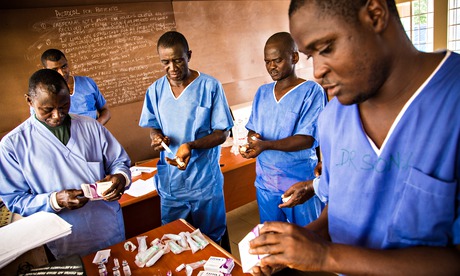
The importance of western aid in helping to build effective health systems in the developing world has been highlighted by a respected international thinktank finding that Sierra Leone, an early source of the Ebola outbreak, was the country least likely to be able to deal with the virus.
The west African state has been ranked bottom of a health index compiled by the Legatum Institute, to be published on Monday, examining the governance of public health in 142 countries along with indices such as infant mortality, life expectancy and healthcare spending.
There are 0.4 hospital beds per 1,000 people in Sierra Leone and health spending is $205 per person, according to the research. It has the second highest rate of tuberculosis in the world (674 per 100,000 people), and the highest incidence of infant mortality at 117.4 per 1,000 live births. The Legatum Institute says that, as a result, the country was “singularly ill equipped to deal with a problem like Ebola”.
James Barty, senior adviser to the Legatum Institute, said: “The Ebola outbreak has shocked the world in how it has continued to spread and the number of lives it is now taking. The warning signs were there, though. Low levels of healthcare spending and weak governance structures in many African countries have been the norm for a considerable length of time. The good news is that the index suggests the west’s health systems, including the UK, are set up to be able to cope with the virus, should it arrive from Africa. In stark contrast to those African countries hit by the outbreak, the west does have the resources and health governance to be able to put into place measures to deal with Ebola.
“The west must continue to help countries like Sierra Leone to prevent a future outbreak from happening.”
The new report follows the finding by the Commons international development select committee last month that budgeted spending for Sierra Leone by the department for international relations has been cut for this year.
The MPs reported that Britain’s reduced funding could have helped compromise Sierra Leone’s health systems, which have disintegrated in the face of the epidemic, exacting a heavy death toll on health workers as well as patients.
Britain’s budget for Sierra Leone and Liberia decreased for 2014-2015 by £14.5m (18.6%) compared with 2013-14.
According to the Legatum Institute, the highest-ranked countries on the health index are the US, Luxembourg, Switzerland, Japan and Norway. The UK is ranked 19th in the world for health, behind major European countries including the Netherlands (6th), Germany (7th) and France (9th), but ahead of Spain (22nd) and Italy (24th).
Both the UK and the US have 2.9 hospital beds per 1,000 people. The US spends almost three times as much on health, but it is largely funded through private contributions. Health spending per year is $8,895 per person in the US compared with $3,495 per person in the UK, the report finds. The Legatum Institute’s global index, which also ranks countries in terms of wealth and wellbeing, further paints an alarming picture of other countries in west Africa, whose populations run the risk of contagion.
Nigeria, Ivory Coast and Mali are similarly ill-equipped for an outbreak. Nigeria is ranked 132nd on the health sub-index, Ivory Coast is ranked 128th and Mali 123rd. Guinea and Liberia, the other two countries most affected by the outbreak of Ebola, are also near the bottom (134th and 129th respectively).
